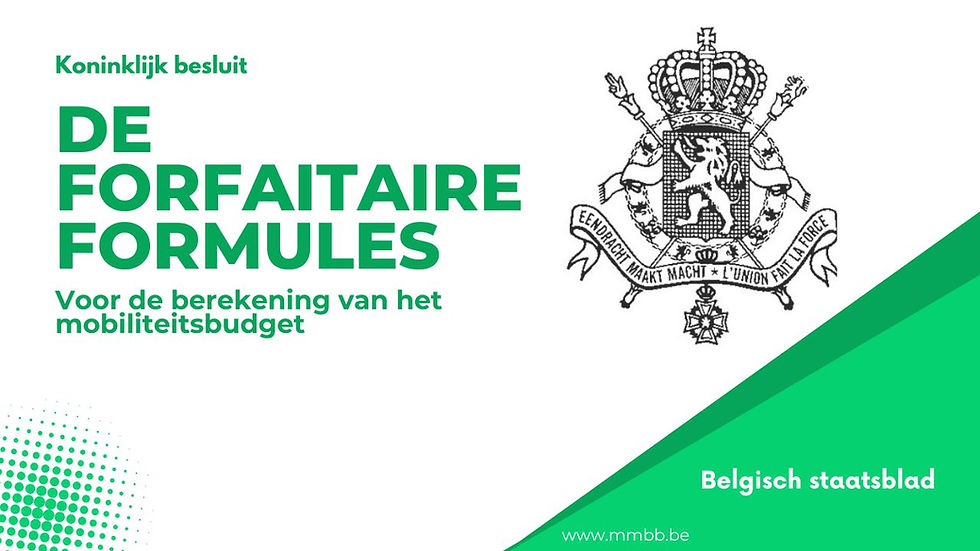The indexation of the mobility budget - Year 2025
- Thierry Devresse

- Dec 21, 2024
- 2 min read
Updated: Dec 23, 2024

Beneficiaries and Indexation of the Mobility Budget
Many recipients of the mobility budget wonder about the possibility of annual indexation, as their budget is typically fixed once their contract is signed. According to the 2019 law, only two situations allowed for an increase:
Promotion: When an employee receives a promotion entitling them to a higher category budget.
Salary Indexation: If the employer chooses, the sectoral salary indexation can be used, in whole or in part, to increase the mobility budget.
Impact of Indexation on the Mobility Budget
When applied, indexation can increase the mobility budget by approximately €0 to €20 per month, with the percentage determined by the employer within the limits of the sectoral salary index. However, most companies do not proceed with indexation for several reasons:
Optional Nature: Indexation remains optional and depends on the company's economic situation.
Decrease in Electric Vehicle Costs: The reduction in battery prices leads to lower costs for electric vehicles, influencing the calculation of the Total Cost of Ownership (TCO).
Discrepancy Between Indices: The mobility budget is based on the TCO of vehicles, but its indexation is linked to the sectoral salary index, sometimes creating a mismatch with economic reality.
International Economic Context: Salary indexation in Belgium already reduces companies' competitiveness, prompting some employers to avoid such measures on the mobility budget.
Timing Constraints: Salary indexation is often confirmed in January, complicating the update of the budget already allocated on January 1st.
Solutions for Employers
No Indexation: The employer can decide not to index, as this decision is optional.
Anticipating Decisions: Some companies decide on indexation as early as November or December, cautiously anticipating the smoothed health index. This allows for scheduling reimbursements from January.
One-Year Deferral: For example, applying the January 2024 salary indexation in January 2025, decided in November 2024.
Solutions for Employees
Await Employer's Decision: The employee can wait before requesting reimbursements, although this may delay those related to housing costs.
Utilize Existing Amounts: The employee can request a reimbursement identical to the previous year, while using the remaining budget for other soft mobility expenses.
New in 2024: Indexation of Minimum and Maximum Thresholds
Since January 1, 2022, the mobility budget must adhere to:
Minimum: €3,000 per year
Maximum: 1/5th of the gross annual salary, capped at €16,000 per year.
Starting January 1, 2024, these amounts are now indexed based on the smoothed health index. The thresholds for 2025 are:
Minimum: €3,164 per year
Maximum: €16,875 per year
New in 2025: Annual Adjustment of the Mobility Budget
Until now, the mobility budget could only be modified in cases of promotion or job change.
Starting January 1, 2025, and pursuant to Circular 2024/C/19 dated February 29, 2024, the employer will be able to adjust an employee's mobility budget once a year in January, based on salary increases received the previous year, within the indexed thresholds.
Note:
Total salary exceeds gross annual salary.
The federal mobility budget website has not yet published this update. This administrative delay should not be considered.


Comments